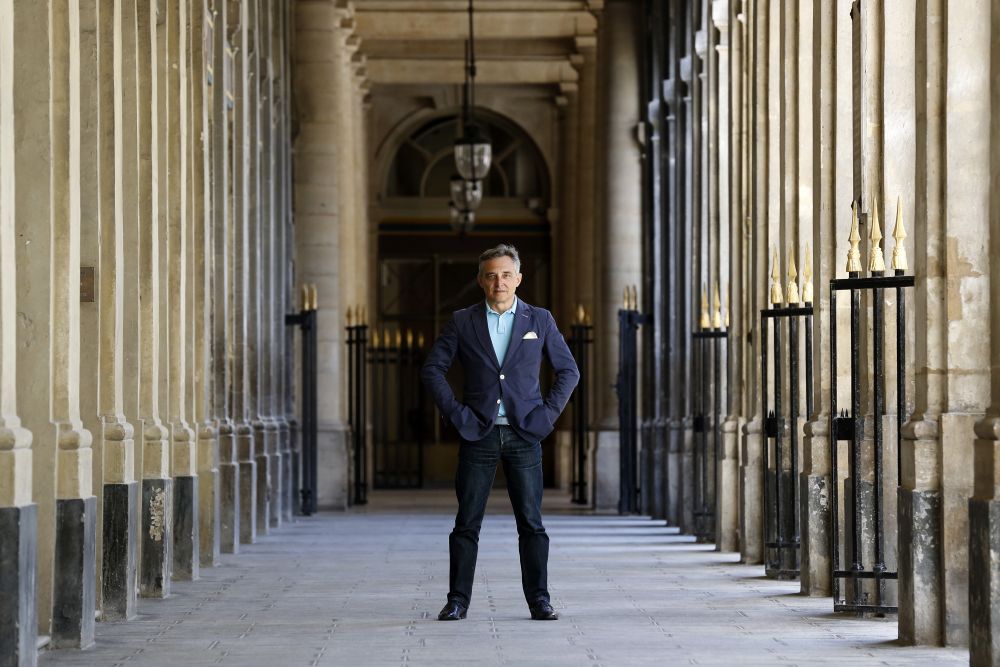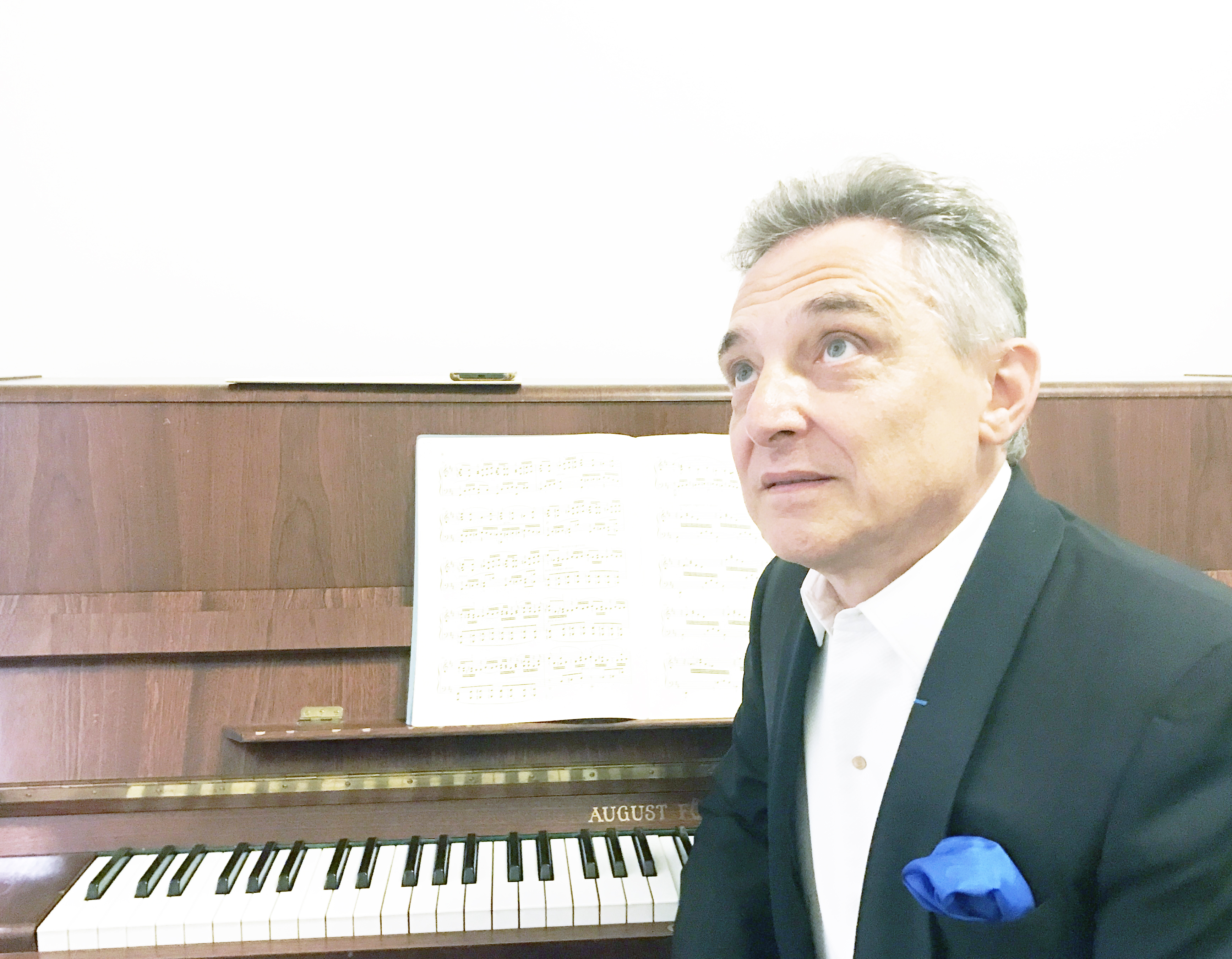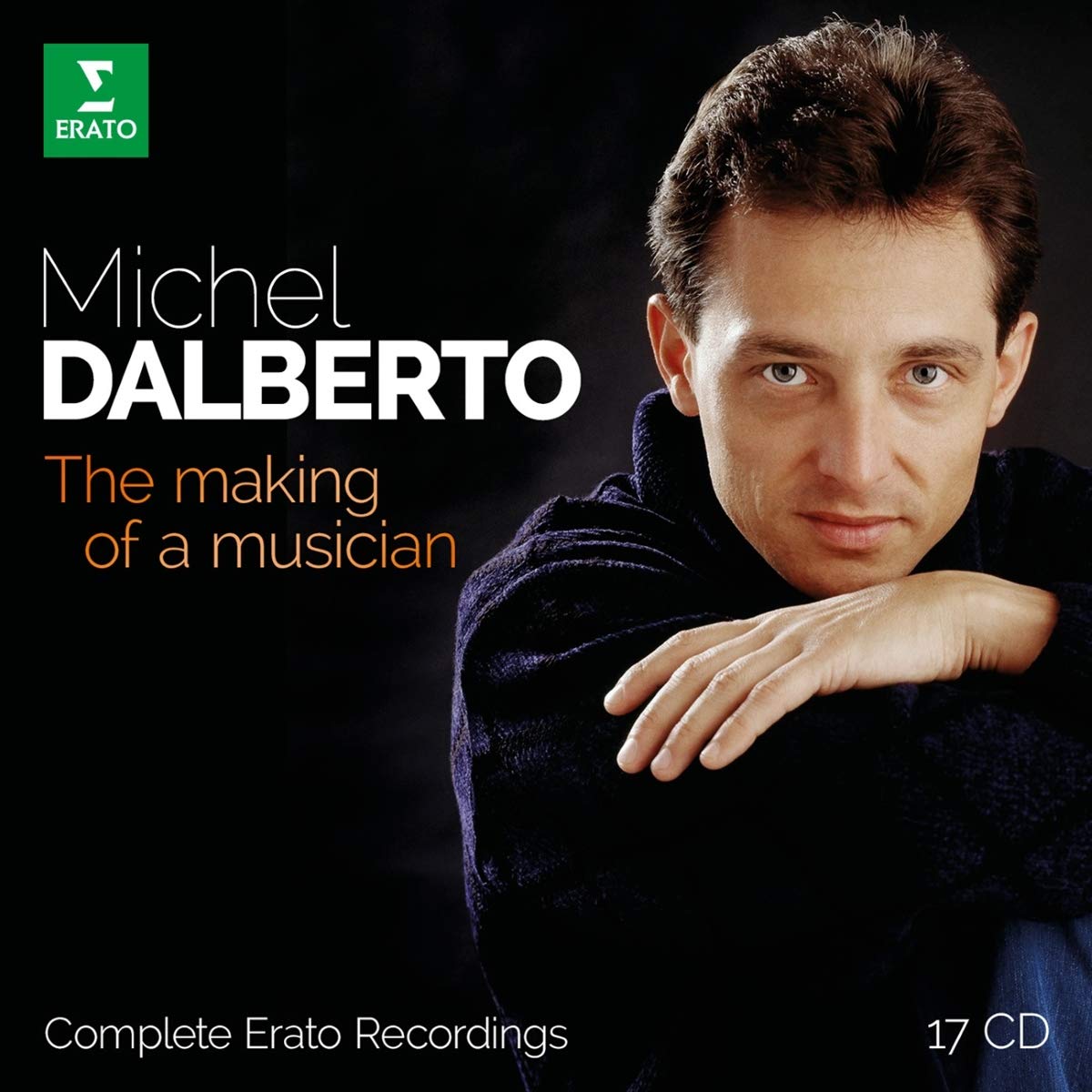

Michel Dalberto was born in Paris on the 2nd of June 1955 to a family he describes as normal. His father worked at the Ministry of Finance, his mother for the State welfare program. Music held no particularly importance in the household: appreciated but not aspired to.
On Christmas Eve 1959, when Michel Dalberto was three years old, a toy appeared under the Christmas tree: a miniature piano. It was the beginning of a big adventure. "Instead of breaking it into pieces as any normal three year old child would do, I was trying to do things with it" recalls Michel Dalberto, now seated in front of me on a leather armchair in Berlin. Noticing by accident his talents, a family friend learned in the ways of music insisted on getting the boy professional instruction.
Today Michel Dalberto is a world-famous pianist and by far one of the most established pianists of the French classical musical scene. He embodies a French touch which is hard to ignore. He lives in Paris, Avenue Foch, is always impeccably dressed and elegantly mannered. He relishes red wine, complements all his meals with bread and never does he utter “bon appétit”. Dalberto also looks 20 years younger than his age, though he indulges in neither sport nor surgery. He is a gourmet. A member of the very selective Club des 100, an all-male culinary club which functions a little bit like the French Academy of Gastronomy. In addition to playing the piano, Michel is an excellent story-teller. Always the right word, always a pungent story or anecdote to share. I recall a dinner at the festival in Périgord. I was at his table, in the company of Parisian men with princely accents and prestigious functions. The conversation circled around wine and Michel captivated the attention of us all with the story of a bottle of Château Petrus 1986 that he shared with Alfred Brendel. We were all seduced, drinking in his words like little children listening to a fairy tale at a hearth fire. The conversation ambled across various wine estates including Mouton, which in French also means sheep. Over eager for an opportunity to interject I blurted out, ”You have sheep?" My neighbour leaned slowly towards me and without emitting the slightest smile, whispered "Mouton-Rothschild." I was horrified.
Despite his natural talent and ease, Michel Dalberto's must be of the only pianists of his rank who does not keep a piano at home. Why would he? The music is always in his head. As he explains in the following interview, ”There is nothing simpler than playing the piano”.
We met in the fall, just before a sumptuous recital he held at the Konzerthaus in Berlin.
***
You played your first concert at five. Can we call you a child prodigy?
No. Such a thing doesn’t exist. I appeared on stage at five and half. I must have played a Sonatina by Beethoven, some Mozart, a Chopin Waltz, but there is nothing prodigious about it. One must understand that playing piano isn’t really complicated. It’s an extremely practical instrument which enables you to do everything. That’s why so many children play the piano. It’s easy. Much easier than learning the violin or the cello. With a piano, you just press on the key and the note is made. What’s complicated is exploring the repertoire and understanding the music. But basically, learning piano is truly easy.
How did you become a pianist?
I had the situation where my parents where wholly supportive of me learning the piano, but simultaneously didn’t give it more importance than any other subject in school. It was absolutely out of question that I quit everything else for the piano. Some teachers would hear me play and tell my parents: “this is remarkable, he needs to stop everything else and play the piano eight hours a day and I don’t which other nonsense advice of this type."
You were therefore not a child prodigy by the precocity of your work?
My childhood was nothing more than normal.
Were you aspiring to become a pianist?
I didn’t think about it, neither did my parents.
 Dressing room, Berlin Konzerthaus, 2018
Dressing room, Berlin Konzerthaus, 2018
So what happened?
When I was 11 or 12 years old I completed a final exam at the conservatory of our neighbourhood. We were living in Paris in the 16th arrondissement. An old lady was in the jury. After hearing me she approached my parents and asked them if she could introduce me to a famous pianist teaching at the Paris Conservatory. That's how I met Vlado Perlemuter. He asked my mother and I to his apartment. I played for him for nearly two hours. Before leaving he told me that if I passed the admission exam at the Paris Conservatory he would mentor me as one of his students. He also said something very amusing which my mother misunderstood. "Your son has something nobody will ever be able to teach him. He has a clean ear. ”My mother replied, "Of course his ears are clean! "
Does a clean ear mean perfect pitch?
Not necessarily. A clean ear is one which correctly understands the music, the harmonic relations and the counterpoints. One which doesn’t produce "anti-musical mixtures”. Perlemuter had, for example, noticed that I would naturally place the pedal correctly. I didn’t mix things up, nor did I produce chaotic sounds.
An instinct.
I guess my brain grasps music naturally, yes.
Perlemuter was a guide for you?
Absolutely. I was very lucky to join his class, which was considered one of the most prestigious in the National Paris Conservatory. Perlemuter had been one of Alfred Cortot's favorite disciples. He had studied all of Ravel’s music with Ravel himself and had also played for Fauré. At the time, I was only 13 years old and didn’t understand what this meant. But when I was asked who I was studying with and answered, Vlado Perlemuter, it had its effect.
Did you have other guides?
Nikita Magaloff, who is also a friend had this mentor effect on me. Other than him, Bendetti-Michelanly remains for me a model and inspiration I will never be able to reach. I never met him, only attended his concerts. Claudio Arrau also impressed me deeply. Though we never met, he helped me understand Liszt for whom I didn’t share a great passion for in the beginning. Today, Liszt is one of my favorite composers and probably the one I play the most after Schubert.
Karajan also had some effect on you if I'm not mistaken?
I had such an admiration for Karajan. For me, he remains one of the greatest artists of the 20th century. I was so lucky to hear him numerous times and to meet him in person. What’s extraordinary with Karayan is that which ever repertoire he conducted, it never sounded wrong. One can agree or disagree with his interpretations, but the sound itself remains impeccable each time.
His Puccini and Verdi operas were fabulous, his Debussy and Ravel mesmerizing, even his Tchaikovsky Symphonies and his Boris Godunov were outstanding. He was also able to make orchestras drastically improve which is a rare quality and the proof of his excellence.
Do you ever experience anxiety or neurosis before going on stage?
I’m neither neurotic nor anxious. I actually don’t know what all this is about.
No special needs to canalize your energy and concentration?
All I need is some water. A rudimentary piano can also be helpful to warm up. But generally speaking, I act normally before a concert. As soon as I get on stage, I’m deeply focused on the music.
Would you be ready to go on stage in 5 minutes and give a recital?
Of course.
It’s particular.
No. I think everybody should be like me.
Let’s say it unusual .
I think there are others like me. I heard for example that Daniel Barenboim doesn’t stress before going on stage. But I guess it’s linked to the confidence he, and incidentally I, have in our brain and memory. If I couldn’t trust my brain and memory, I wouldn’t be able to trust anything. Brain and memory are the fundaments, which I rely upon.
I supposed you never consulted a psychiatrist?
(Laughter). No! God forbid. But who knows, maybe I would play better if I were a little more anxious and neurotic.
 Cover box-set of 17 CD's, released at Erato Recordings, September 2018
Cover box-set of 17 CD's, released at Erato Recordings, September 2018
To keep in touch with the piano, is it not necessary to play regularly?
No. That’s the other great advantage of the piano. What is needed, however, is to stay in contact with music and this is something I do 24/7.
How?
Just by thinking. Currently I am thinking of something I will play tomorrow evening. I’m constantly imagining and listening to music. It can be quite exhausting.
You are already in the flow, ready to go on stage?
I am always in the flow. Not necessarily by thinking about what I'm going to play. It can be any other piece of music which passes through my head. An opera excerpt, an orchestra or string quartet piece. I systematically question the tempo, phrasing or color indicated by the composer. Whatever I hear, whether it’s for piano or not, I visualize myself playing. Because my mind immediately analyzes the music it hears, I can’t resist. It’s been like this for nearly 60 years. And that’s why in a way, I hate music.
Because it’s everywhere?
Everywhere. It's terrible.
As soon as you go to a café, a shop, a hotel, you are assaulted by music?
It's a nightmare. And of course most people don’t understand this.
Many musicians suffer from the same sensitivity.
For sure. It also proves how much I must love my partner, Calvin. Not only do I let him listen to music, but his musical tastes are very far from mine! When I’m alone, there is no music on ever. First of all because it’s in my head, second, because silence remains for me the most beautiful music ever. It's a nightmare to hear this constant Muzak as Glenn Gould would call it, everywhere. In the elevator, the station, the airport, the hotel lobby. You can no longer escape it. And when you kindly ask if it would be possible to lower the volume, people look at you as if you were crazy.
They don’t understand.
I find it particularly disturbing in restaurants. I was once dining with John Eliot Gardiner, the English conductor. We were both very disturbed by the music. He ended up proposing a deal to the restaurant manager. "I'm not asking you to stop the music he said. But simply to lower it gradually. If someone is opposed, you can immediately raise the volume back up. ” The gentleman agreed and gradually lowered the sound till zero. No one ever noticed that the music had stopped.
Are there composers you struggle to grasp?
I never quite understood Chopin and Haydn (I have a problem with humour in music). So I tend to avoid them as I’m not sure to be able to find the path which would lead me to understand them. I have this often with Russian music too, like with Prokofiev, Stravinsky, or even to some extent Shostakovich. What I really fully understand is 19th century German and French music. Being born in the same culture and country is of invaluable help. I’ve been breathing since birth the same air, the same light, and all these parameters matter.
If you could reincarnate. You can choose the era, the country, the profession, a personality, legend, anything. What would you choose?
Maybe as a Formula One driver. A Formula One driver in the 50s or 60s after the War. But I would like to avoid dying in an accident if possible. That mustn’t be much fun, don’t you agree? But yes, to participate to the 24 hours of Le Mans in the 50s, when drivers still had to run and jump into their cars would please me. It had quite some allure. An elegance which rarely exists today.
Let’s say you are a philanthropic billionaire and you are obliged to give away some of your money. To which cause would you give it?
I’d hate to be a billionaire.
Why?
I wouldn’t mind being a little wealthier. To be able for example to plan trips, rent a plane, a boat, a helicopter, invite friends to the Mediterranean or the Caribbean. I would quite enjoy being able to do this, but I wouldn’t want to be much wealthier. I don’t see the utility of it. And I’m not someone who enjoys owning things.
For some, owning gives the illusion of being free for others it represents a weight.
For me it’s definitely a weight. A weight which comes with many troubles.
But let’s suppose you have these billions
I’d get rid of them as quickly as possible.
Where?
I’d inform myself and distribute them equally where they could be needed. In an environmental cause, a medical one and so on.
There isn’t one cause which you happen to be more sensible to?
Perhaps, animal rights and welfare.
You are also a scuba diving amateur. What attracts you to this activity?
It's a kind of philosophy for me. Everything is so different. It’s the wonder of literally immersing myself in a universe which is no longer ours, but which probably was ours a few million years ago. And to be accepted by its inhabitants. If it were the other way around and the undersea creatures decided to visit us on earth, I’m not sure we would be as friendly with them as they are with us.
Do you like sharks?
Well they are the most beautiful of all. A turtle can be quite charming too.
What fascinates you about sharks?
They are extraordinary machines which never needed to evolve. They are perfect. Take a sleeping shark for example. You approach it and all of a sudden, it's gone. It’s gone and nothing in its body moved. It fascinates me.
You are also a gourmet, food and wine lover.
Yes, my problem is that I have too many passions, too many interests. I often think I should devote more of my time to music. Because in a way, music isn’t a passion.
What is it then?
It helps me live. And the piano helps me make a living. (Ca m'aide à vivre. Et le piano m’aide à en vivre.)
***